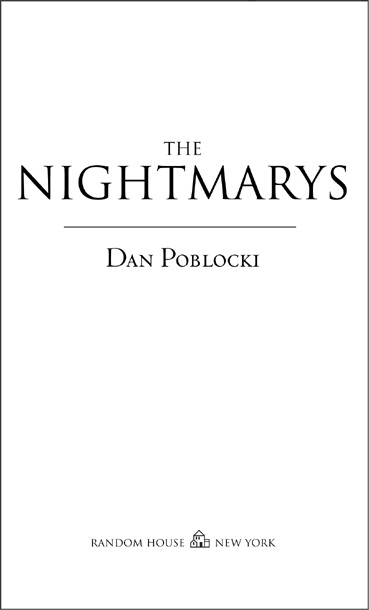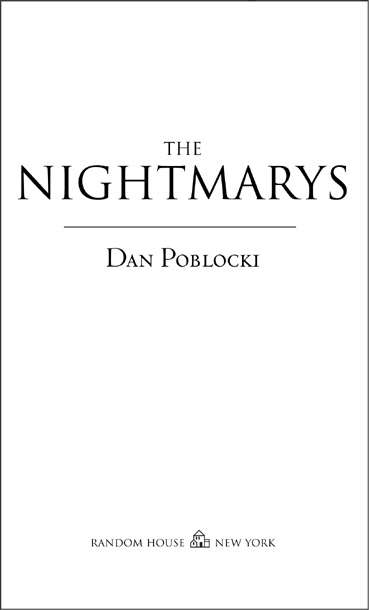The Nightmarys
Authors: Dan Poblocki



ALSO BY DAN POBLOCKI
The Stone Child


For Brendan and Emily
CONTENTS
Cover
Other Books by This Author
Title Page
Dedication
Prelude
Chapter 1
Chapter 2
Chapter 3
Chapter 4
Interlude
Chapter 5
Chapter 5
Chapter 6
Chapter 7
Chapter 8
Chapter 9
Chapter 10
Chapter 11
Chapter 12
Part 3 - The Haunting of Abigail Tremens
Interlude
Chapter 14
Chapter 15
Chapter 16
Chapter 17
Chapter 18
Chapter 19
Chapter 20
Chapter 21
Chapter 22
Chapter 23
Chapter 24
Chapter 25
Chapter 26
Chapter 27
Interlude
Chapter 28
Chapter 29
Chapter 30
Chapter 31
Chapter 32
Chapter 33
Chapter 34
Chapter 35
Chapter 36
Chapter 37
Chapter 38
Chapter 39
Chapter 40
Chapter 41
Chapter 42
Chapter 43
Chapter 44
Chapter 45
Chapter 46
Chapter 47
Chapter 48
Endings
Chapter 49
Acknowledgments
About the Author
Copyright
… the act of the passing generation is the
germ which may and must produce good or
evil fruit in a far-distant time …
—Nathaniel Hawthorne,
The House of the Seven Gables
Where does madness leave off and reality
begin?
Is it possible that even my latest fear is sheer
delusion?
—H. P. Lovecraft,
The Shadow over Innsmouth
“The girl’s got sass,” said the old man with a
snarl.
“But that’s never stopped me before.”
—Ogden Kentwall,
The Clue of the Incomplete Corpse:
A Zelda Kite Mystery
INVISIBLE THINGS
PRELUDE
THE MAYFAIR APARTMENTS—
NEW STARKHAM, MASSACHUSETTS
On a Tuesday afternoon in early March, Zilpha
Kindred prepared to do the laundry, as she’d
done almost every Tuesday afternoon for the
past forty years. This week, though, the old
machine in her apartment was broken, so she
left her schnauzer mix—an inquisitive lit le dog
named Hepzibah—and wheeled the laundry
basket to the elevator.
Downstairs, when the doors opened, the
basement was almost entirely unfamiliar to the
elderly woman, and a wave of unease
overcame her. The corridor was longer than she
recal ed. The light was dim. The pipes hung
from the low ceiling, craning at wicked angles
from the low ceiling, craning at wicked angles
every which way. A bit er scent lingered in the
air. She was suddenly afraid and brie y
considered returning to her apartment to cal
the local laundry service. But she had been
doing her own laundry forever. And real y,
what did she have to be afraid of?
Zilpha walked for what seemed like an
eternity before turning toward the laundry
room. Its ickering uorescent light instantly
made her dizzy. She wished then that she had
fol owed her earlier instinct and turned around.
But she gured the job would be quick, and
then she could go back upstairs and carry on
with her day. In the meantime, she’d brought
an old paperback to keep her company.
She l ed and started the washer, then sat
and waited and read her book. The water
cycled. After a few minutes, Zilpha heard a
thumping noise inside the machine. It became a
hard, constant banging, as if she had
accidental y dropped a shoe in with the
detergent. When she opened the lid, she found
detergent. When she opened the lid, she found
the basin l ed with soapy water. Whatever
was making the sound was hidden at the
bot om. With a hu , she rol ed up her sleeve
and reached in, digging through the wet
clothes. Finding nothing unusual, she closed the
lid. Whirring, the machine started up again.
But before she sat down, the thumping noise
returned. She thought it might just be the
shifting weight of the load working itself out
somehow. She listened for a few more seconds
before opening the lid again.
To her surprise, a red froth had boiled at the
water’s surface. Unlike the suds she’d seen
earlier, there was a new substance, which
reminded her of fat particles that rise to the top
of a soup broth. Oily like meat. And worse, that
bit er scent she encountered when the elevator
door had opened was stronger now, as if
coming from the red water. Her rst instinct
was that there was a problem with the machine
or possibly the pipes. She decided to try
another washer. Disgusted, she slowly reached
another washer. Disgusted, she slowly reached
into the basin to remove the pile of wet
clothes.
But as Zilpha held the load, the laundry
seemed to squirm like a fish. Alive. She shouted
and dropped the pile back into the water, then
stumbled away, her stomach in her throat.
Immediately, she tried to reason that she had
imagined it. Brie y, she worried that Hepzibah
had slipped inside the laundry bag upstairs, but
then remembered kissing the dog goodbye at
the apartment door. Zilpha could think of
nothing, absolutely nothing, that might have
provided a logical explanation for what she
had just experienced, and so she reasoned that
the sensation must have been in her head.
She eased her breathing, trying to calm her
nerves. As she peered into the basin, where the
clothes had sunk beneath the surface, her own
dark re ection stared back from behind chunks
of gristle. White globs of gore clung to her
blank silhouet e.
Then the lights ickered, and she could not
Then the lights ickered, and she could not
bear another moment in that horrible
basement. She decided to nd Mario, the
doorman, upstairs. She didn’t care if she came
across as a foolish old ninny. But when she
headed back toward the long hal way, she
heard something splash behind her. Zilpha
turned and looked. The lights dimmed further,
as if playing a game.
Then the entire washer lurched toward her so
violently, the cords and pipes pul ed out of the
wal . The red water spil ed over the edge of the
basin and ran like blood down the front of the
machine in a great gory wave.
That was enough to set her running. She did
not look back until she reached the elevator
and frantical y pushed the but on. The long
hal way stared back at her quietly. Seconds
later the door opened and she slipped into the
car, pressing the but on for the lobby.
But before the door slid shut, Zilpha saw a
man come around the corner at the end of the
hal way. She could not see his face, but she
hal way. She could not see his face, but she
knew him nonetheless. He stood there in his
tal dark overcoat watching her, as he had
watched her in her memories for many years.
As the door closed between them, she felt
herself slipping away. By the time the elevator
reached the lobby, she was unconscious.
She awoke in a hospital bed. Mario had found
her and cal ed an ambulance. The doctor
explained that Zilpha’s daughter and
granddaughter were on their way from New
Jersey to help take care of her, but this news
did not calm the old woman. If what she’d seen
in the basement was real, she would have
wished Sarah and Abigail to be as far from
New Starkham, Massachuset s, as possible.
When she asked the nurse for a phone so she
might contact her daughter to convince her to
stay home, the nurse simply placed her hand
over the old woman’s own, trying to comfort
her. Zilpha, however, knew that this was not
the type of demon who was quel ed with
the type of demon who was quel ed with
comfort.
Action must be taken, and soon.
This was not good. Not good at al .
1.
Timothy July rst noticed the jars lining the
top shelf along the side of room 117 at the
beginning of the school year, but by mid-April
he’d stil not looked closer. The specimens
inside the jars had been pickled decades earlier
in an opaque and yel owish liquid by some
forgot en alumnus of Paul Revere Middle
School. Over the years, most of the labels had
faded or peeled away from the glass, and so the
true identity of the strange multilegged worms,
the twisted slimy bodies of mammalian fetuses,
and the hol ow exoskeletons of beetles would
be left to the imaginations of those students
